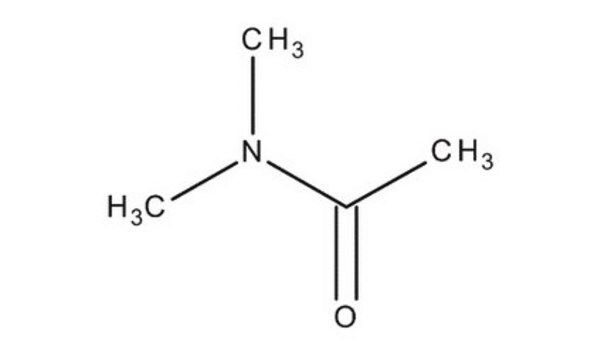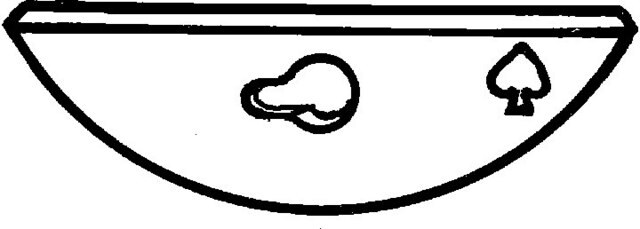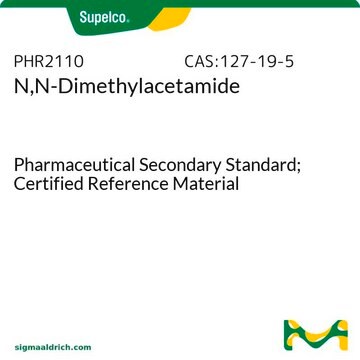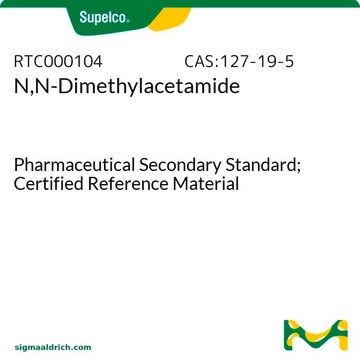270555
N,N-Dimethylacetamide
suitable for HPLC, ≥99.9%
About This Item
4 mmHg ( 38 °C)
Recommended Products
grade
HPLC grade
vapor density
3 (vs air)
vapor pressure
2 mmHg ( 25 °C)
4 mmHg ( 38 °C)
assay
≥99.9%
form
liquid
autoignition temp.
914 °F
expl. lim.
1.8 %, 100 °F
11.5 %, 160 °F
technique(s)
HPLC: suitable
impurities
<0.030% water
evapn. residue
<0.001%
Looking for similar products? Visit Product Comparison Guide
Related Categories
Application
- Ternary Phase-Field Simulation of Poly(vinylidene fluoride) Microporous Membrane Structures Prepared by Nonsolvent-Induced Phase Separation with Different Additives and Solvent Treatments: This study highlights the use of N,N-Dimethylacetamide (DMAC) in the preparation of advanced poly(vinylidene fluoride) membranes, showcasing its critical role in enhancing polymer processing and membrane structures in material science (Zhang et al., 2024).
- Improved Protein Removal Performance of PES Hollow-Fiber Ultrafiltration Membrane with Sponge-like Structure: Research demonstrates DMAC′s effectiveness in the production of high-performance ultrafiltration membranes, emphasizing its importance in biomedical applications and wastewater treatment (Zhao et al., 2024).
- Poly(vinylidene fluoride) Aerogels with alpha, beta, and gamma; Crystalline Forms: Correlating Physicochemical Properties with Polymorphic Structures: This article showcases the versatility of DMAC as a solvent in the synthesis of poly(vinylidene fluoride) aerogels, linking its use to significant advancements in the understanding of polymer crystallinity and properties (Suresh et al., 2024).
- Cellulose Esters: Synthesis for Further Formation of Films with Magnetite Nanoparticles Incorporated: The study leverages DMAC for the synthesis of advanced cellulose ester films integrated with magnetite nanoparticles, illustrating its potential in developing multifunctional materials for diverse industrial applications (Furlan Sandrini et al., 2024).
Packaging
As a global leader in lab reagents, we are constantly looking for new ways to optimize the safety of our products. The newly developed 4L solvent bottle design features advanced sealing technology that eliminates leaks to make the handling of solvents safer and more convenient than ever before.
See all the new features here!
signalword
Danger
hcodes
Hazard Classifications
Acute Tox. 4 Dermal - Acute Tox. 4 Inhalation - Eye Irrit. 2 - Repr. 1B
Storage Class
6.1C - Combustible acute toxic Cat.3 / toxic compounds or compounds which causing chronic effects
wgk_germany
WGK 2
flash_point_f
147.2 °F - closed cup
flash_point_c
64 °C - closed cup
Choose from one of the most recent versions:
Already Own This Product?
Find documentation for the products that you have recently purchased in the Document Library.
Customers Also Viewed
Related Content
The 4L M-Bottle provides safe handling of solvents due to an innovative solvent bottle design with sealing technology to eliminate leaks and reduce risks in solvent dispensing.
Our team of scientists has experience in all areas of research including Life Science, Material Science, Chemical Synthesis, Chromatography, Analytical and many others.
Contact Technical Service










